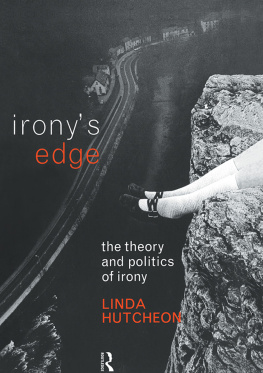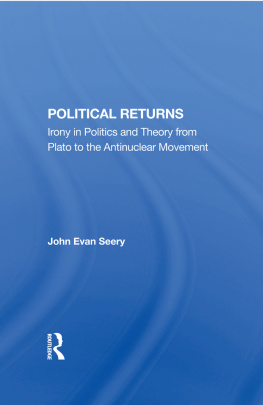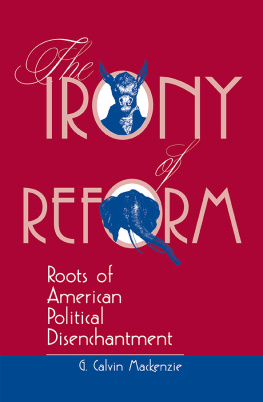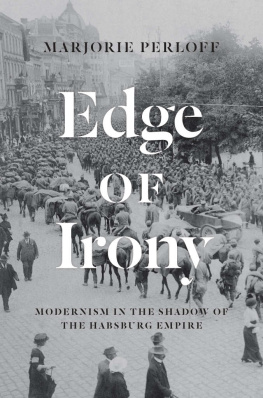IRONYS EDGE
The theory and politics of irony
Linda Hutcheon

First published 1994
by Routledge
11 New Fetter Lane, London EC4P 4EE
This edition published in the Taylor & Francis e-Library, 2005.
To purchase your own copy of this or any of Taylor & Francis or Routledges collection
of thousands of eBooks please go to www.eBookstore.tandf.co.uk.
Simultaneously published in the USA and Canada
by Routledge
29 West 35th Street, New York, NY 10001
1995 Linda Hutcheon
All rights reserved. No part of this book may be reprinted or reproduced or utilized in any
form or by any electronic, mechanical, or other means, now known or hereafter
invented, including photocopying and recording, or in any information storage or
retrieval system, without permission in writing from the publishers.
British Library Cataloguing in Publication Data
A catalogue record for this book is available from the British Library
Library of Congress Cataloging in Publication Data
A catalogue record for this book has been requested
ISBN 0-203-35925-9 Master e-book ISBN
ISBN 0-203-37181-X (Adobe eReader Format)
ISBN 0-415-05452-4 (hbk)
ISBN 0-415-05453-2 (pbk)
ISBN 978-1-134-93754-7 (epub)
CONTENTS
ACKNOWLEDGEMENTS
This book is dedicated to the members of WIPE (Work in Progress in English), a group of both junior and senior colleagues at the University of Toronto who read much of this manuscript over the last few years. Their helpful suggestions, devastating criticisms, and general enthusiasm and support were all equally important in making this study possible in this form.
In a field where there is so much fine work, it is hard to know where to start to pay ones intellectual debts. While the works of many critics have been crucial to my thinking (and the references to them in the text bear witness to their number and impact), a few names stand out: Wayne Booth, Ross Chambers, Joseph Dane, Peter Hagen, D.C. Muecke, Allan J. Ryan, Alan Wilde, and Hayden White. Some of these have generously and critically read parts of this work, but my debt to all is a more general and deep one. To Sharon Butler and Alain Goldschlger, the first people with whom I ever thought through some of ironys problems, go thanks for stimulating me to start on this topic over a decade ago; gratitude for helping me work through some of the thornier issues goes to the students and faculty in my 198889 irony seminar at York University and in the 1990 International Summer Institute for Structural and Semiotic Studies course, and to the graduate students in the 198990 and 199394 graduate seminars at the University of Torontos Centre for Comparative Literature. To the university departments and conference organizers over the last few years who bravely let me try out some of these ideas on a live audience go my thanks for their indulgence and for making possible important interactions that often changed utterly the direction of my thinking. A special thanks goes to those colleagues and students at the University of Puerto Rico and University of Victoria, with whom I was fortunate enough to spend more extended periods of time. And, without the bibliographical and technical expertise of Christine Roulston, Russell Kilbourn, and Catherine Lundie, this book would literally, physically, never have been possible.
Many friends, students, and colleagues (besides the WIPErs) read parts of this book or provided examples or references that have been particularly helpful. I have endeavored to incorporate their criticisms and suggestions as much as possible. Warm thanks to Susan Bennett, Victor Burgin, Bill Callaghan, Mark Cheetham, David Clarkson, Melba Cuddy-Keane, Chandler Davis, Christopher Douglas, Heather Dubrow, Rebecca Duclos, Len Findley, Mark Fortier, Ken Frieden, Susan Gingell, Carol Greenhouse, Marjorie Halpin, Adrienne Hood, Anne Lancashire, Michael Levin, Jill Levinson, Beauvais Lyons, Katie Lynes, Tim McCracken, Eva Mackey, Robert Martin, Peter Narvez, Shirley Neuman, Kristin Roodenburg, Margeret Sinex, Joey Skaggs, Bob Wallace, Richard A. Watsonand to any of you I have inadvertently omitted. Full credit for any errors or infelicities of any kind in this text goes, of course, solely to me.
A special debt is owed to my husband, Michael Hutcheon, whose own sense of irony is likely the reason why I had to figure out how irony worked: theory as self-defense. But our collaborative research projects and common interests also provided the perfect discursive community in which to try out ideas and to explore possible attributions of irony.
At Routledge, I must thank Janice Price for her encouragement, her faith, and her friendship; Talia Rodgers for the enthusiasm, expertise, unfailing patience, and good humor that kept me and this book going; Tricia Dever for her generous assistance and efficiency; Bill Germano, for conversations about opera and books, as well as valuable advice.
In these times of economic recession that place increased pressures on universities and their teachers, it is the release time made possible by the generosity of funding organizations that makes research even possible for many of us. Because of this, my sincere gratitude is to the Connaught Foundation at the University of Toronto and the John Simon Guggenheim Memorial Foundation.
Very little of this book has appeared in print in any form: some of the general ideas and part of the discussion of the work of Anselm Kiefer appeared as the E.J. Pratt Memorial Lecture published by Memorial University of Newfoundland; an early version of what was to become, in a different form, section II of Chapter 2 appeared as The Complex Functions of Irony in Revista Canadiense de Estudios Hispnicos, vol. 16 no. 2 (1992): 21934. A much longer and differently focused discussion of the Into the Heart of Africa museum exhibit featured in Chapter 7 was given as the 1993 Routledge Lecture and appeared in Textual Practice (Spring 1994).
The ironist is a vampire who has sucked the blood out of her lover and fanned him with coolness, lulled him to sleep and tormented him with turbulent dreams.
Sren Kierkegaard, The Concept of Irony
Lespce de gens a qui 1ironie est antipathique claire aussi sa nature. Ce sont les femmes et le peuple. Le peuple ne comprend pas lironie; la femme non plus. Le peuple voit sous lironie un orgueil de lintelligence, une insulte a Caliban. Quant a la femme, elle est peuple par son incomprhension et par son mpris de lintelligence. La femme est surtout une physiologie et une sensibilit, non un cerveau. Lironie, attitude de crbral en qui saffirme le primat de lintelligence sur le sentiment, lui est suspecte et antipathique. La femme est et reste un tre passionn dans sa chair et dans ses nerfs.
Georges Palante, Lironie: tude psychologique
women, children, and revolutionaries hate irony, which is the negation of all saving instincts, of all faith, of all devotion, of all actions.












